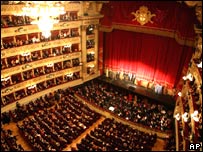| 1. the person who directs the performance of musicians or a piece of music | | |
| 2. a building where people can watch a performance or other activity | | |
| 3. the area in a theatre which is often raised above ground level and on which actors or entertainers perform | | |
| 4. the group of people gathered in one place to watch or listen to a play, film, someone speaking, etc. | | |
| 5. a man who is very skilled at playing or conducting music | | |
| 6. the large painted pictures used on a theatre stage to represent the place where the action is | | |
| 7. a woman whose job is sewing and making clothes | | |
| 8. to write or provide music for a poem or other words so that they can be sung | | |
| 9. the main actor in a film or play | | |
| 10. a theatre which is specially designed for operas to be performed in | | |
| 11. a large piece of cloth with buildings, countryside, etc. painted on it that is hung at the back of a stage | | |
| 12. a large group of musicians who play many different instruments together and are led by a conductor | | |
| 13. a song sung by one person in an opera | | |
| 14. the last time a play, opera, dance, etc. is practised before the real performance | | |

